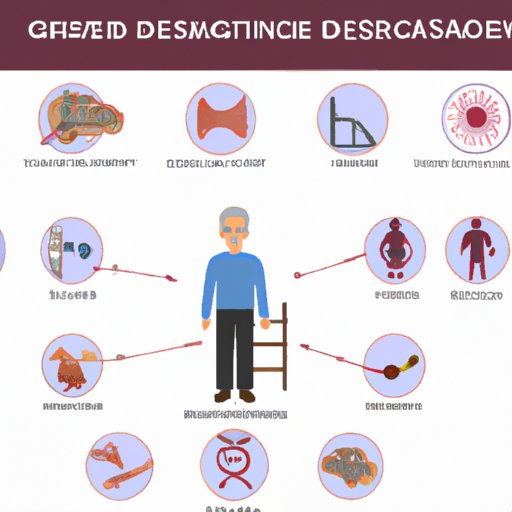
Introduction
Have you ever heard of degenerative diseases? They are a group of medical conditions that cause a breakdown of tissues and cells within the body over time. Although they are often associated with advanced age, degenerative diseases can affect people of all ages. In this article, we will dive into what degenerative disease is, and how it affects the human body. We’ll also explore the different types of degenerative diseases, solutions and treatments, prevention, genetic factors, mental health impact, and personal stories of people living with these diseases.
What is Degenerative Disease and How Does it Affect the Body?
Degenerative diseases refer to a medical condition that causes the body tissues to break down gradually. This can affect various systems in the body such as the central nervous system, muscles, skeletal system, and the respiratory system, leading to major health issues. Since degenerative diseases are chronic and progressive, they can create lasting effects on the human body. This often leads to limited mobility, problems with speech, coordination, and other crucial functions.
The symptoms of degenerative diseases are generally slow in onset and can take time to become noticeable. For instance, in the case of Alzheimer’s disease- which is one of the most common forms of degenerative diseases- changes in the brain can occur for almost a decade before symptoms become apparent.
Several factors can contribute to the development of degenerative diseases. This includes genetic factors, environmental factors, and lifestyle choices such as poor diet, smoking, and lack of exercise.
Understanding the Different Types of Degenerative Diseases and Their Symptoms
There are different types of degenerative diseases, which can be categorized into three main categories: Neurodegenerative diseases, Musculoskeletal degenerative diseases, and genetic degenerative diseases.
Neurodegenerative Diseases
These types of degenerative diseases impact the central nervous system, which includes the brain and spinal cord. The most prevalent type of neurodegenerative diseases includes Alzheimer’s disease, Parkinson’s disease, amyotrophic lateral sclerosis (ALS), and Huntington’s disease.
Alzheimer’s Disease
Alzheimer’s disease is a neurological disorder that accounts for a significant portion of all degenerative diseases. It generally affects people over the age of 65 and can significantly impact cognitive abilities such as memory and language. As the disease progresses, more severe symptoms might appear such as confusion, disorientation, and dementia.
Parkinson’s Disease
Parkinson’s disease mainly affects movement-related functions such as speech, coordination, and balance. People with this condition might experience tremors, stiffness, and difficulty moving. While the causes of Parkinson’s disease are not strictly understood, genetic, and environmental factors are thought to play a role.
Musculoskeletal Degenerative Diseases
These degenerative diseases affect the bones, joints, and muscles of the body. The most common musculoskeletal degenerative diseases include osteoarthritis and rheumatoid arthritis.
Osteoarthritis
One of the most commonly reported musculoskeletal degenerative diseases, osteoarthritis is a condition that affects the joints and the surrounding tissue. This can lead to pain and reduced mobility in the affected joints. As people age, they become more prone to developing osteoarthritis, and it can impact any joint in the body.
Rheumatoid Arthritis
Rheumatoid arthritis is an autoimmune disease that causes inflammation in the joints, often characterized by pain, swelling, and stiffness. This disease can affect any joint in the body and some internal organs such as the heart or lungs.
Genetic Degenerative Diseases
Unlike other types of degenerative diseases that can be triggered by several factors, genetic degenerative diseases are primarily caused by mutations in a person’s DNA. Some of the most common types of genetic degenerative diseases include cystic fibrosis, Huntington’s disease, and muscular dystrophy.
Huntington’s Disease
Huntington’s disease is a genetic disorder that impacts brain functions. It generally appears during middle age and can cause various symptoms such as emotional problems, cognitive declines, and involuntary movements.
Cystic Fibrosis
Cystic fibrosis is a genetic disorder that causes the production of thick mucus in the lungs and other organs such as the pancreas and the digestive system. This condition can lead to several significant symptoms such as shortness of breath, coughing, wheezing, and digestion-related problems.
Solutions and Treatments for Degenerative Diseases
Although degenerative diseases are often chronic and progressive, several treatments, medications, and lifestyle changes can positively impact the progression of these diseases. While these treatments cannot cure degenerative diseases, they can help mitigate the symptoms and improve quality of life.
Medications
Several medications can slow down the progression of degenerative diseases or reduce symptoms. Depending on the type and severity of the disease, doctors might prescribe different medications. For instance, anti-inflammatory drugs or painkillers might be recommended for musculoskeletal degenerative diseases, while antidepressants or anti-anxiety medication might help those struggling with neurodegenerative diseases cope with psychological symptoms.
Physical Therapy
Physical therapy is an effective way to manage pain, improve mobility, and reduce symptoms associated with degenerative diseases. For instance, patients with Parkinson’s disease might be recommended to undergo physiotherapy or patients with arthritis could undergo joint flexibility training to reduce pain and stiffness.
Surgery
In severe cases, surgery might be necessary to manage or reduce the symptoms of degenerative diseases. Surgical procedures such as joint replacement surgery can help people with osteoarthritis maintain their mobility or people with Parkinson’s disease might undergo deep brain stimulation to reduce tremors and dyskinesias.
Prevention of Degenerative Diseases Through Lifestyle Changes
Although degenerative diseases can be caused by several factors, lifestyle changes such as a healthy diet, regular exercise, and avoiding smoking and alcohol can significantly reduce the risks of developing degenerative diseases.
Eating a Healthy Diet
A healthy diet that includes nutrient-rich foods such as fresh fruits and vegetables, lean protein, and whole grains can help reduce inflammation, promote heart health, and reduce the risks of degenerative diseases.
Regular Exercise
Regular exercise can help maintain weight, promote cardiovascular health, and improve mental health, mitigating the risk factors of several degenerative diseases. It’s also been shown to improve bone density and reduce the risks of musculoskeletal degenerative diseases.
Avoiding Smoking, Alcohol, and Drug Use
Smoking, excessive alcohol consumption, and drug use can all severely impact overall health and increase the risk factors for several degenerative diseases. Avoiding these habits or seeking help for addiction can significantly reduce the risks associated with these diseases.

The Role of Genetics in Degenerative Diseases
Although several factors can cause degenerative diseases, genetic factors play a significant role in some cases. Understanding these factors can help people take steps to reduce the risks associated with genetic degenerative diseases.
Explanation of Genetic Factors
Genetic factors refer to the genetic information that can be inherited from a person’s parents. These genes can influence several traits and characteristics depending on how they are expressed or interact with other genes. In the context of degenerative diseases, genetic factors might cause mutations in a person’s DNA that can lead to the development of certain disorders.
How Genetics Causes and Triggers Degenerative Diseases
Genetic mutations can impact several biological processes in the body and cause the breakdown of tissues or cells. This can lead to several degenerative diseases such as cystic fibrosis, Huntington’s disease, muscular dystrophy, and more. In cases where genetics cause degenerative diseases, it’s usually passed down through family members via genes.
Genetic Testing and Counseling
Genetic testing is an effective way to determine if there are any genetic mutations that increase the risk factor for developing degenerative diseases. This can help people take preventative measures and reduce their risks associated with these diseases. Genetic counseling can also be an effective tool for people with a family history of degenerative diseases, helping them understand the risks and prepare for the future.
The Impact of Degenerative Diseases on Mental Health
Degenerative diseases can significantly impact mental health, leading to stress, anxiety, or depression. It’s essential to address these emotional concerns to improve the quality of life and reduce the burden that comes with these challenging conditions.
Stress and Anxiety
Dealing with chronic health issues can be stressful and lead to anxiety in patients. This can further exacerbate the symptoms of degenerative diseases and impact the quality of life. Patients might be advised to seek counseling or practice relaxation techniques such as meditation or deep breathing exercises.
Depression
Depression is a prevalent symptom of degenerative diseases and can further reduce the quality of life of patients. Seeking counseling or joining support groups can help patients cope with depression and improve their mental health.
Coping Strategies for Mental Health
Several coping strategies such as cognitive-behavioral therapy, relaxation techniques, and meditation can help patients cope with their mental health issues. It’s essential to work with a healthcare professional to develop a tailored plan to cope with these issues.
Personal Stories About Living with Degenerative Diseases
Personal stories of people living with degenerative diseases can be inspiring and offer hope and valuable insights into living with these disorders. It’s essential to talk about these stories to reduce the stigma associated with degenerative diseases and promote awareness and empathy for patients.
Real-Life Stories of People with Degenerative Diseases
There are several real-life stories of people living with degenerative diseases, and these stories can provide insights into coping strategies and offer hope and inspiration to those struggling with these diseases.
Challenges They Face
Living with degenerative diseases can pose several challenges, from maintaining mobility to coping with emotional issues such as depression and anxiety. Patients might also face social stigma and require adjustments to their environment and routine.
How They Overcome These Problems
Despite the challenges associated with degenerative diseases, many people have successfully adapted their lifestyle and routine to cope with these problems. Through physical therapy, medication, and lifestyle changes, patients can manage their symptoms and improve the quality of life.
Conclusion
Degenerative diseases can significantly impact the quality of life of individuals and their loved ones. While there is no cure for these conditions, several treatments, lifestyle changes, and coping strategies can help mitigate the symptoms and slow down the progression of these diseases. Early detection and proactive management can make a significant difference in the outcomes of degenerative diseases. It’s essential to spread awareness and reduce the stigma associated with degenerative diseases to promote empathy and a better understanding of the struggles patients face.
Final Thoughts
We hope this article has provided valuable insights into degenerative diseases, their symptoms, impact, and how they can be managed and treated. While dealing with these conditions can be challenging, there are several steps individuals can take to reduce their risks and improve their quality of life. It’s essential to maintain a positive outlook, stay proactive, and seek help when necessary.
Call to Action
Spread awareness! Share this article on social media or with your loved ones and promote empathy and understanding around degenerative diseases. If you or someone you know is struggling with these conditions, seek help from healthcare professionals and support groups.





